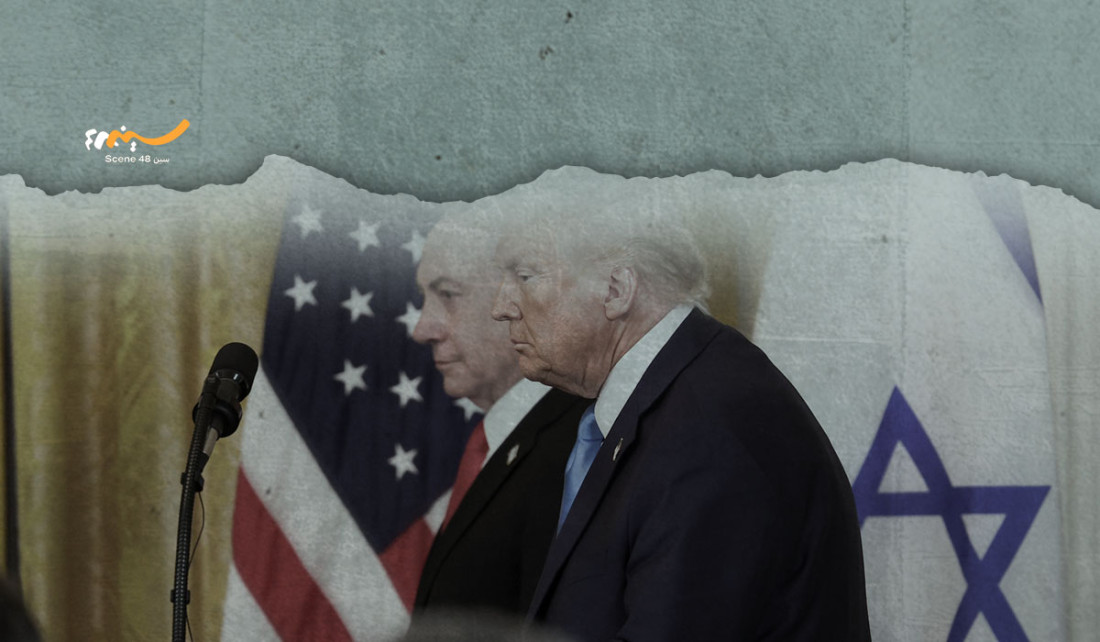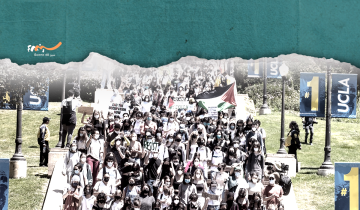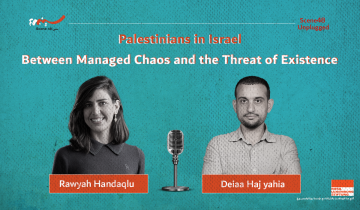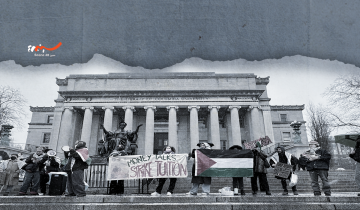The Palestinian American Fight for Identity and Rights

The Palestinian community in the U.S., composed of both long-established Palestinian Americans and more recent arrivals, has historically grappled with questions of identity, political belonging, and civil rights. In recent years, however, the challenges facing this community have intensified. Escalating repression of political expression, legal efforts that blur the line between antisemitism and legitimate criticism of Israel, widespread doxxing and blacklisting campaigns, and mounting immigration vulnerabilities have created an environment of existential uncertainty. These threats not only limit the ability of Palestinians in the U.S. to freely express their views and preserve their heritage, but also place them at risk socially, professionally, and politically. The treatment of Palestinians under the current administration has also diverged sharply from that of the previous one, further shaping the ways in which Palestinian Americans navigate public and private life.
One of the most pressing existential threats arises from the legal and administrative frameworks that govern free expression in the United States. The increasing reliance on the International Holocaust Remembrance Alliance (IHRA) definition of antisemitism in federal education enforcement has blurred the boundaries between antisemitic hate speech and political criticism of Israeli policies. When applied in investigations under Title VI of the Civil Rights Act, this definition has effectively chilled speech on campuses and in civic spaces by threatening to classify Palestine-related activism as a form of discrimination. At the state level, anti-BDS (Boycott, Divestment, and Sanctions) legislation has further compounded the problem. More than half of U.S. states now require individuals and companies to pledge not to boycott Israel as a condition for public contracts or investment. For Palestinian Americans, such measures impose a direct penalty on political expression, creating a system of viewpoint discrimination that constrains economic and civic participation.
Another layer of threat stems from the criminalization of Palestinian advocacy. Federal agencies and law enforcement continue to emphasize a heightened security environment in which Muslim, Arab, and Palestinian communities are viewed with suspicion. Organizations, student groups, and charities associated with Palestine often face aggressive scrutiny even when their activities remain fully lawful. Although this rarely results in direct prosecution, the mere fact of surveillance or interviews by federal agencies exerts a chilling effect, deterring individuals from civic engagement and discouraging charitable or political involvement.
At the social level, Palestinians in the U.S. face sustained campaigns of doxxing and blacklisting. Online platforms such as Canary Mission have systematically targeted Palestinian students, academics, and professionals, publishing their personal information and branding them as extremists. The reputational harm caused by these blacklists is significant, often leading to difficulties in securing employment, graduate admission, or professional advancement. Universities and employers, fearful of reputational risks, sometimes treat such blacklists as credible signals, which magnifies the harm.
Universities, in particular, have become sites of repression. Since 2023, Palestine-related activism has faced unprecedented restrictions. Students have been suspended or disciplined for organizing protests, while faculty members have faced heightened scrutiny for their public positions on Israel-Palestine. Administrative responses have often involved police referrals, creating records that follow individuals beyond the campus and into their professional lives. Such measures not only constrain freedom of expression but also reinforce the message that Palestinian identity and advocacy are liabilities in American public life.
Finally, immigration and mobility remain areas of vulnerability. Palestinians who are not U.S. citizens face discretionary risks in visa approval and renewal. The revocation of visas for Palestinian officials seeking to attend United Nations meetings in 2025 underscores the precarious position of Palestinians under the current administration. These actions send a broader signal that immigration benefits and access to the United States can be withheld or revoked for political reasons, creating uncertainty for students, academics, and professionals who rely on U.S. entry to pursue education or employment.
The existential threats outlined above manifest in a series of day-to-day challenges for Palestinians living in the United States. Employment insecurity is one such challenge. Doxxing campaigns and workplace complaints often result in individuals losing their jobs or being passed over for opportunities. For students, disciplinary measures at universities can leave permanent marks on their records, affecting graduate school applications or professional trajectories. Access to public platforms is also restricted. Event cancellations, donor pressure, and ad-hoc university policies have curtailed Palestinians’ ability to organize lectures, cultural activities, or public discussions.
Beyond these tangible barriers, the psychological toll has been considerable. Harassment, threats, and ostracism have produced widespread self-censorship within the Palestinian community. Many individuals refrain from engaging publicly on Palestine-related issues for fear of social and professional consequences. This retreat into silence not only undermines individual well-being but also erodes the visibility of Palestinian narratives in the public sphere.
The approach of the U.S. government toward Palestinians has shifted between administrations. Under President Biden, there were limited efforts to acknowledge Palestinian vulnerabilities. In February 2024, Biden issued Deferred Enforced Departure (DED) for certain Palestinians, offering temporary protection from deportation. Later that year, the administration unveiled a National Strategy to Counter Islamophobia, which explicitly acknowledged the rise of anti-Palestinian discrimination. These measures, while largely symbolic and limited in scope, provided some recognition of the particular challenges faced by Palestinians.
The current Trump administration has taken a markedly different approach. Since January 2025, it has escalated federal enforcement of Title VI complaints against universities, relying heavily on the IHRA definition of antisemitism. It has also supported congressional efforts to codify IHRA standards into law, thereby entrenching the conflation of political activism with discriminatory conduct. Furthermore, the revocation of visas for Palestinian officials ahead of U.N. meetings reflects a harder diplomatic line with real consequences for Palestinian mobility. While both administrations maintained strong support for Israel, the Biden administration coupled that stance with limited protective gestures toward Palestinians, whereas the Trump administration has prioritized enforcement and restriction, heightening the risks faced by Palestinians in the U.S.
These threats and challenges directly influence Palestinian American behavior. Many have resorted to self-censorship, avoiding social media commentary, public protests, or even private conversations that could be misinterpreted. Others have shifted career paths, deliberately avoiding fields such as academia, public policy, or media, where exposure to blacklisting is most acute. At the same time, Palestinian Americans have demonstrated resilience by building stronger networks of community organizing and legal defense. Advocacy organizations now provide rapid-response support to students and workers facing disciplinary action or termination. Large-scale protests and coalitions with civil-liberties groups also illustrate a refusal to retreat completely from public life. However, travel behavior has become more cautious. Non-citizens, in particular, are wary of international travel that might subject them to visa complications or secondary questioning upon re-entry.
In light of these realities, Palestinian Americans and Palestinians in the U.S. must adopt proactive strategies to mitigate risks and build resilience. On an individual level, this includes documenting incidents of discrimination, consulting legal counsel when necessary, and strengthening digital security practices to counter doxxing. At the community level, there is a need for Title VI literacy, mutual-aid networks, and mental health support to address the psychological toll of harassment. For those with immigration vulnerabilities, careful planning and legal consultation are essential before international travel.
At the political level, Palestinian Americans can play an active role in challenging anti-BDS legislation in state legislatures, registering and voting in local and national elections, and building coalitions with other groups committed to free speech and civil liberties. Public communication is also critical: publishing op-eds, briefing journalists, and foregrounding universal rights-based narratives can counter the stigmatization of Palestinian identity. By reframing their struggle as part of a broader fight for civil liberties, Palestinian Americans can situate their cause within a wider movement for justice and equity in the United States.
Palestinians in the United States today face a confluence of existential threats and practical challenges that affect nearly every dimension of life: legal, professional, educational, and psychological. The difference between the current administration and the previous one lies in the degree of enforcement and confrontation. While limited relief was offered under President Biden, the Trump administration has escalated measures that intensify risks for Palestinians in the United States. These dynamics have pushed many toward self-censorship and caution, yet they have also fostered resilience and collective organizing. The path forward lies in a balance between risk management and proactive civic engagement. By investing in legal literacy, coalition-building, and public advocacy, Palestinian Americans can mitigate immediate threats while laying the foundation for long-term political empowerment.

Mohammad Al-Kassim
A senior Middle East correspondent for TRT WORLD with nearly two decades of reporting experience. He covers politics, conflict, and human rights, producing in-depth news, analysis, and documentaries that highlight underreported stories and perspectives from the region.



